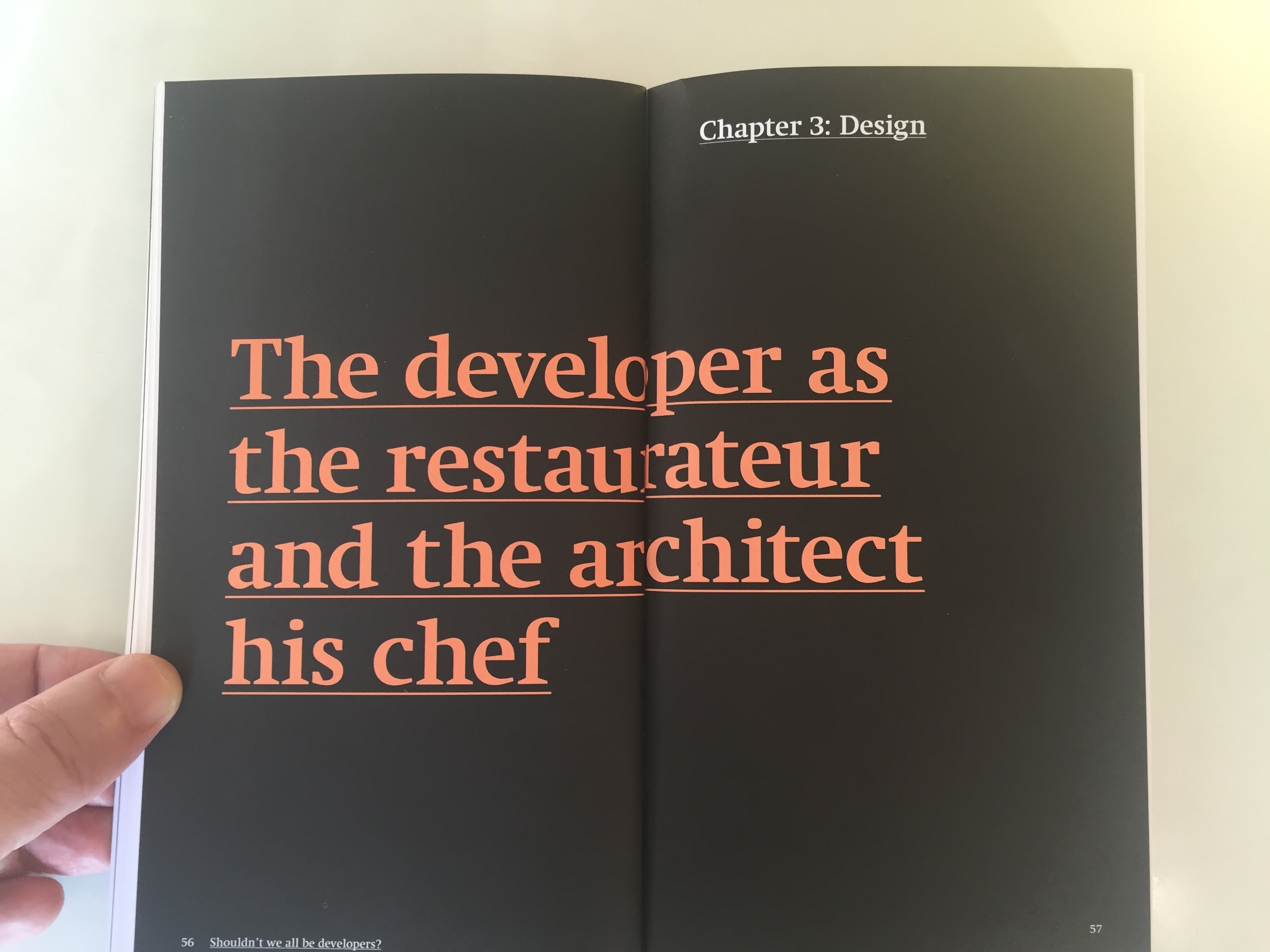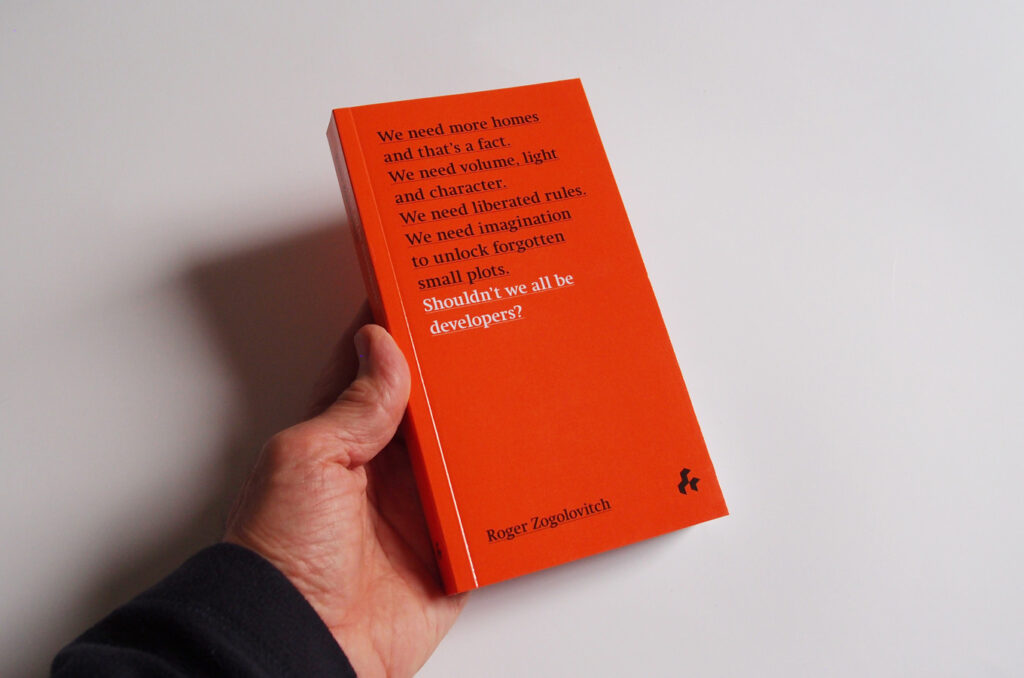Shouldn’t We All Be Developers

Shouldn’t We All Be Developers is a book by Architect & Developer Roger Zogolovitch, founder of {Solidspace}, a design and development company in London. I was really excited to pick up this book. It is a short book now only available on Kindle at {Amazon.com}. Roger recently gave an interview on the Business of Architecture podcast with Enoch Sears {here} which is really fantastic and worth a listen. Roger has a lot of experience and insight as an architect who develops work.
From the title and list of chapters, I really thought it would heavily touch on architects (who I thought was the “we”) developing their own work. I was wrong. This is more of a manifesto of utilizing what author Roger Zogolovitch calls “gap sites.” London real estate, like most of the western world, has seen a surge of growth in the past decade. Prices are unreachable by the general populous. Zogolovitch wants cities to focus on smaller, leftover parcels of land that go undeveloped. He identifies gap sites as “spaces next to railways, behind houses, around factories and warehouses.” He lobbies for an increase in providers of housing through more permissive and “rational” legislative regimes.
There really isn’t much beyond the idea of gap sites. He walks through a few of his ideas, most of which are very contradictive, and ultimately include a heavy-handed government giving him an advantage over the market. There is almost a complete naiveté in his belief that society would be best off if we handed over the keys to a select few, who would naturally do the right thing. “If enough smaller guys got together, they could make a better fist of things than the big battalions who seem to dominate ideas about where and how we should live, and what it should look like… If we champion this smaller scale, independent developer, not only will they use their skills and imagination to build that supply, they will use their development instinct to identify these gap sites to deliver their projects.” I don’t buy it. Most developers are chasing the last dollar. Criticism aside, he does create really nice work. His recent project that he developed and London firm AHMM designed is beautiful and has won many awards.

Zogolovitch became frustrated as a practicing architect with the professional practice in the UK. “I decided to take on a wider responsibility for my work. I wanted to be in control of the projects that I undertook and I wanted to be able to engage with all aspects of making buildings, not just their design.”
Zogolovitch argues in his first chapter on Planning that the planning permission required in London real estate waters down a project to the quickest iteration that the designers could achieve. Planning permission is critical to a development’s financial success, and should be done as soon as possible in the design process in order to secure the project for the developer. This “determines a building be built to its earliest and least developed design iteration, allowing the quality of the finished development to suffer.” This is his argument that government should get out of the way of development. Let there be an as-of-right system similar to other global cities such as New York City.
In the second chapter on Land, Zogolovitch discusses the trading market for undeveloped London raw land. There is apparently a value assessed to a land’s potential, and that value is traded between international investors until someone takes that raw land and begins construction. At which point, the potential value is void and the real value will be assessed. This trading market drives up prices of not only raw land, but all land within the city and makes homes writ large unaffordable for many Londoners. Zogolovitch wants to end this practice.
Zogolovitch also brings up the fact that nearly sixty percent of undeveloped land in London is owned by the Local Authorities. Zogolovitch proposes to create a new government entity called the London Land Commission (LLC) that would assemble these parcels (both those owned by Local Authorities and ones by foreign investors) solely to promote the development of new homes.
This entire argument is counterintuitive to Zogolovitch’s initial argument of less government interaction. This time, when it is advantageous for the “small, local developer,” he wants a heavy-handed government to give him a leg up over the market. While he personally may have the best of intentions, I cannot buy into the idea that all “small, local developers” will have equally good intentions. If there is an incentive being handed to developers, of any sort, those seeking maximum gain regardless of quality will find a way.

In Zogolovitch’s fourth chapter on Brand, he argues that larger companies such as John Lewis should be developers. John Lewis is a large department store chain similar to Macy’s in the United States. He argues that a large brand name could help reassure otherwise NIMBY’s (Not In My Back Yard) that the development next to them is of quality by quality people.
“Followers would positively welcome John Lewis branded housing next door to them for they would trust the brand to act in as considerate and thoughtful a manner possible so as not to disrupt their lives or run an untidy site during construction. The would expect the brand to deliver on their promise of quality, carefully priced housing, good value and customer service as principles upheld throughout.”
This entire idea blows my mind. While I do agree that a branded product is a really good idea for the real estate market, and an identity that people could gather behind would likely help sales, none of this would help in providing housing to people at a lower price. You cannot run a jobsite that will bow to the needs of neighbors without driving up costs or time (which is also cost). This is also another contradiction of Zogolovitch’s argument within the book. He wants small developers, but the biggest name brands? Large companies, especially ones who want to protect their brand identity, which is what he is arguing for, are not going to work with small, local developers. They will be bigger than Toll Brothers or Turner Construction. This contradicts a lot of his earlier arguments.
I personally believe that large-scale consolidation of home building will happen in America. I do believe this will help drive some costs down, but most definitely at the expense of watering down the product even further.

In the fifth chapter on Money, Zogolovitch discusses the London mortgage market and how it has escalated in recent years to prohibit many people from every qualifying to finance a home. I was really hoping that this chapter would have real information and proposals of the financial realities of development. Instead, Zogolovitch once again is asking for this new government entity, the LLC, to undermine market speculation and “enlist the support of a new brand of independent developers.” He argues that the LLC should legally separate land from the buildings developed atop of it to drive down the costs of development. Instead of the LLC selling off land to developers, though only these small independent ones, the LLC would lease the land to the development and retain ownership. This is an interesting proposition, but once again argues for a heavy government hand helping a select few developers. His firm, Solidspace, would no doubt be one of those.

Overall, I think that Zogolovitch has an incredible naiveté about development. “Independent and small-scale developers are a resource for the making of more homes and have the right skills needed to work on small gap sites.” There is no evidence that small-scale developers have any more morals than any other developer. Trust is an important asset for all parties in the construction industry, developers, architects, contractors, subcontractors, etc. Zogolovitch argues that for the past 40 years, developers have picked the low hanging fruit as sites to be redeveloped and that the next phase of housing will be both more complex and more interesting as a consequence. This is likely true.
Overall, Shouldn’t we all be Developers is a decent read and worth a few hours of your time. It is a short book currently only available on Kindle at {Amazon.com}. The book is a manifesto on why we should exploit gap sites as a means of helping London’s current housing crises. Roger has developed some amazing buildings and knows his stuff. That said, I can’t help but be a bit agitated with his view of a heavy-handed government giving him an advantage over market economics. There is too much emphasis on the small-local-developer being a good guy.
I think his gap site idea is really great, and not the first time I have heard it. Architect & Developer Jonathan Tate of OJT in New Orleans is also doing something similar with his Starter Home* project. See more about Jonathan {here}.
